|
|
|
Sort Order |
|
|
|
Items / Page
|
|
|
|
|
|
|
| Srl | Item |
| 1 |
ID:
175470
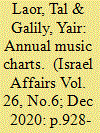

|
|
|
|
|
| Summary/Abstract |
Radio is a cultural producer and a main player in the music industry. Radio operates a system that determines which music will be broadcast and which music will not make it ‘on the air,’ functioning as gatekeeper for the general audience. Such a system gives radio significant influence on the music to which listeners are exposed. By way of offering a comprehensive picture of the diverse tastes, styles and trends of popular music in Israel, this article examines the mix of the common musical taste in Israeli society as reflected in the audience votes for the annual music charts that were broadcast on Gal Galatz radio station for 15 years. Findings show that pop music is the most common music in the charts and accounts for 45%, in contrast to rock music, which shows a declining trend. Mediterranean music has grown in popularity in recent years to become an integral part of mainstream music and accounts for a significant proportion of the mix of popular music according to Israeli listeners.
|
|
|
|
|
|
|
|
|
|
|
|
|
|
|
|
| 2 |
ID:
143702
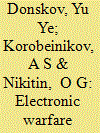

|
|
|
|
|
| Summary/Abstract |
The authors give an updated definition of EW forces as an arm of the Land Forces, offer their view of EW targets, and also the very special style the EW forces use to fight their electronic and information war in an army operation
|
|
|
|
|
|
|
|
|
|
|
|
|
|
|
|
| 3 |
ID:
158915
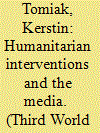

|
|
|
|
|
| Summary/Abstract |
Humanitarian interventions routinely come with media components, because of the media’s assumed ability to counter hate and support reconciliation. Radio programmes for peace should enable audiences to withstand manipulation and react non-violently in conflict situations. Based in the ideological tradition of modernisation theory, these programmes assume that violent conflict can be overcome by educating individuals. Based on original data from South Sudan, this paper argues that social structure and duty to leaders play a bigger role and that present media interventions are ill suited to the problem. Interventions need to be tailored to the situation instead of relying on generalised responses.
|
|
|
|
|
|
|
|
|
|
|
|
|
|
|
|
| 4 |
ID:
109536
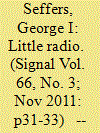

|
|
|
| 5 |
ID:
159239
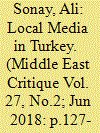

|
|
|
|
|
| Summary/Abstract |
Since the Justice and Development Party (AKP) came to power in 2002, the greater visibility of religion and the emergence of a conservative middle class have reconfigured the boundaries of what is thinkable and sayable in Turkey, particularly in the media. Despite its importance to media consumers, academic analysts have marginalized radio compared with television and the press. Yet increasing commercialization and local concentration have affected mainstream music radio and reshaped religious broadcasting. This article focuses on local radio in the periphery. How does the radio landscape in Central Anatolia, a region reflecting the conservative bourgeoisie’s new dominance, mirror and link to the dominance of the AKP? Fieldwork conducted in Konya, one of the Anatolian ‘Tigers’ and a centre of AKP support, provides the empirical data for this case study.
|
|
|
|
|
|
|
|
|
|
|
|
|
|
|
|
| 6 |
ID:
153317
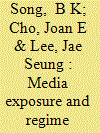

|
|
|
|
|
| Summary/Abstract |
This study explores whether and how exposure to mass media affects regime support in competitive authoritarian regimes. Using geographical and temporal variation in newspaper circulation and radio signal strength in South Korea under Park Chung Hee's competitive authoritarian rule (1961–1972), we find that greater exposure to media was correlated with more opposition to the authoritarian incumbent, but only when the government's control of the media was weaker. When state control of the media was stronger, the correlation between media exposure and regime support disappeared. Through a content analysis of newspaper articles, we also demonstrate that the regime's tighter media control is indeed associated with pro-regime bias in news coverage. These findings from the South Korean case suggest that the liberalizing effect of mass media in competitive authoritarian regimes is conditional on the extent of government control over the media.
|
|
|
|
|
|
|
|
|
|
|
|
|
|
|
|
| 7 |
ID:
130133
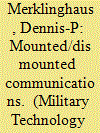

|
|
|
|
|
| Publication |
2013.
|
| Summary/Abstract |
The article offers a review of vehicle mounted radios including the TDRS from Rockwell Collins Inc., the SWave vehicular radio from Selex ES SpA, and Military IP Radio (MIPR) from Elbit Systems Ltd.
Dedicated vehicle mounted radios have several performance advantages versions over MANPACK and hand held radios, not experiencing the size, weight and power limitations enabling higher power output, more effective antenna and because its vehicle mounted, its height gives additional performance enhancements. Dismounted radios have to not be a burden to the soldier and keep him in touch with his unit, vehicle and HQ.
|
|
|
|
|
|
|
|
|
|
|
|
|
|
|
|
| 8 |
ID:
102263
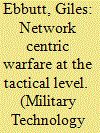

|
|
|
| 9 |
ID:
190979
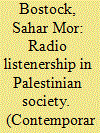

|
|
|
|
|
| Summary/Abstract |
This article examines the reception of radio in Palestinian Arab society from the 1930s until the 1948 war. The article breaks new ground by reconstructing the geographical distribution of radio sets throughout Mandate Palestine and analysing the practices of radio listening. The article argues that radio built on earlier forms of communication and entertainment and depended on existing cultural practices to reach Palestinian society. Radio listening often took place in public spaces and overlapped with the consumption of other media, such as communal newspaper reading. The impact of listening in public was twofold: first, access to radio was shaped by existing social and economic hierarchies and consequently reinforced them; second, public radio listening encouraged critical media reception and cultivated political debates. This way, Palestinians undermined the intentions of the colonial government and used radio for their own ends. By investigating the experiences of radio listeners in Palestine this article sheds light not only on the cultural life of Palestinian Arabs during the British Mandate, but also on the multi-layered, multi-directional workings of media in colonial contexts.
|
|
|
|
|
|
|
|
|
|
|
|
|
|
|
|
| 10 |
ID:
154503
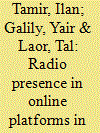

|
|
|
|
|
| Summary/Abstract |
This article explores the ways in which the medium of radio is currently being used on Israel’s various online platforms. It shows how via their internet presence, radio stations have begun broadcasting live online, offering select segments of their programmes, and maintaining correspondence and dialogue with their listeners. Moreover, the traditional radio stations have also been staking their claim to social media with a growing number of them not only present on Facebook, Twitter, LinkedIn, and YouTube, but also branching out to a variety of mobile apps in an attempt to engage with their listeners.
|
|
|
|
|
|
|
|
|
|
|
|
|
|
|
|
| 11 |
ID:
192902
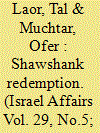

|
|
|
|
|
| Summary/Abstract |
Israeli prisons have recently initiated a rehabilitation program known as Prison Radio. This article suggests that since prison radio shares similar characteristics with educational radio, inmates may operate the radio stations with high motivation and self-fulfilment since they determine the content of the programs. Inmates may also acquire work-related tools and habits and strengthen their self-confidence, which allows adopting constructive behavioural patterns. Therefore, empowering prisoners through radio station activities may encourage their normative reintegration into society.
|
|
|
|
|
|
|
|
|
|
|
|
|
|
|
|
| 12 |
ID:
161387
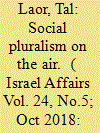

|
|
|
|
|
| Summary/Abstract |
Internet radio stations that broadcast exclusively on the Internet are a growing phenomenon in Israel, providing a stage for new and diverse voices in Israeli society. This article charts the activity of Internet radio stations in Israel and evaluates their social contributions by focusing primarily on music selection, broadcast content, and target audiences. It shows that the establishment of Internet radio stations is connected to progressive trends in Israeli society. New and varied voices, not necessarily heard before in traditional media and especially traditional radio, have been given a platform for the first time. This makes Internet radio an important expression of social pluralism in communications media, which is essential and necessary for the healthy maintenance of a democratic society with so many internal divisions.
|
|
|
|
|
|
|
|
|
|
|
|
|
|
|
|
| 13 |
ID:
185878
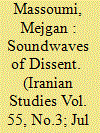

|
|
|
|
|
| Summary/Abstract |
In the decades of the 1960s and 1970s, sound recording technologies—including radio and cassettes—proliferated in Afghanistan and reached transnational lengths. While the state came to dominate these technologies, it could not prevent users from circumventing its censors with alternative perspectives and discourses. This article highlights the examples of Farīda ʿUsmān Anwarī, a noted radio announcer, producer, and journalist, and Aḥmad Ẓāhir, Afghanistan's most popular musical icon to date, to showcase the ways in which the Persianate literary canon served as the medium for sounding dissent amid the changing social and political dynamics of the time. Pushing the boundaries of recorded speech created an alternative space where dissent became possible and the strategic use of mass media paved the way for transnational sonic solidarities among a diverse community of listeners across the Persian-speaking world and beyond.
|
|
|
|
|
|
|
|
|
|
|
|
|
|
|
|
| 14 |
ID:
118137
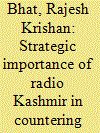

|
|
|
|
|
| Publication |
2013.
|
| Summary/Abstract |
Like any other government-owned media institution, Radio Kashmir has historically been entrusted with a mission to safeguard the territorial integrity of India and help in guarding its vital strategic interests. It acts as an agency that bridges the gap between the government and the people and creates a favourable opinion of India as a strong, modern and secular democracy in a region where fundamentalism and military ambitions have created rogue states.
European countries used the radio as a psychological weapon and a propaganda tool, particularly during World War II. Pakistan has been abusing its own medium of sound since 1947, allegedly with a motive to weaken India, and to win over the people of Jammu and Kashmir (J&K) by exploiting their religious sentiments.1 An analysis of militants' activities in J&K over the last two decades will reveal that Pakistan has been trying to woo the youth of J&K to act as an illegitimate army to bleed India 'through thousand cuts'. Although the infiltration process may be slow at the moment, the danger continues to lurk. Trade relations between India and Pakistan have improved and the two neighbours may arrive at an agreement regarding Kashmir in the days to come. However, Pakistan will continue to foment trouble in the state that it sees as an 'unfinished agenda of Partition'. The institution of Radio Kashmir will again have its tasks clearly cut out in such a changed geostrategic scenario.
|
|
|
|
|
|
|
|
|
|
|
|
|
|
|
|
| 15 |
ID:
059224
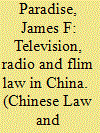

|
|
|
|
|
| Publication |
Jul-Aug 2004.
|
|
|
|
|
|
|
|
|
|
|
|
|
|
|
|
| 16 |
ID:
175145
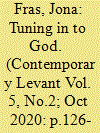

|
|
|
|
|
| Summary/Abstract |
Sound and spoken language play a major role in contemporary Islamic media. On Islamic advice programmes in Jordan, a genre of radio show in which listeners call in to the station with questions regarding pious Sunni Muslim conduct, broadcasters use language in ways that conveys authority to the Islamic textual tradition, and therefore presents their responses as legitimate advice for pious Muslims. By manipulating the language of quotations, broadcasters both ‘entextualise’ segments of language and develop dialogical relationships with Islamic texts – principally, the Qur’an and hadith literature – as well as the audiences addressed and co-present callers. Though the programmes provide a forum for public discussion of religious issues, a linguistic anthropological analysis nevertheless reveals the persistent asymmetry and exclusion inherent in this type of mediated interaction: hosts remain supremely authoritative dispensers of advice to lay callers, and the programme’s listenership is idealised as a pious Jordanian Sunni Muslim audience from which non-devout individuals are excluded. Details of communicative interaction must, therefore, be given careful attention when examining the role of religious media in the contemporary Middle East.
|
|
|
|
|
|
|
|
|
|
|
|
|
|
|
|
| 17 |
ID:
183996
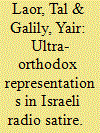

|
|
|
|
|
| Summary/Abstract |
The growing power of the media to define social values and perceptions is a conspicuous feature of contemporary life. Radio is one such shaper of social reality perceptions. While much of the media research focuses on secular organisations operating in a Western, liberal context, not much attention has been paid to this tension between religion and modernity within media outlets. This article examines representations of Israel’s Jewish ultra-orthodox minority in Israel’s daily radio satire shows, a popular and intuitive medium. It shows that content is usually based on the broadcasters’ spontaneous feelings contrary to other media. The findings in the article depict an isolated community out of touch with public consensus and mainstream society.
|
|
|
|
|
|
|
|
|
|
|
|
|
|
|
|
|
|
|
|
|